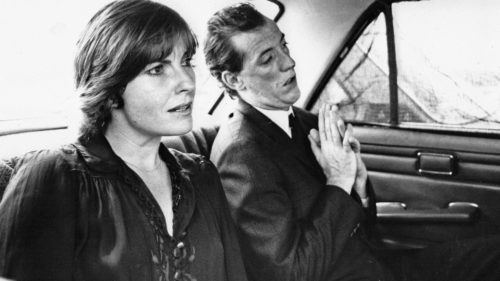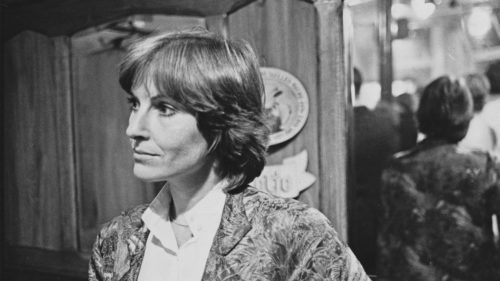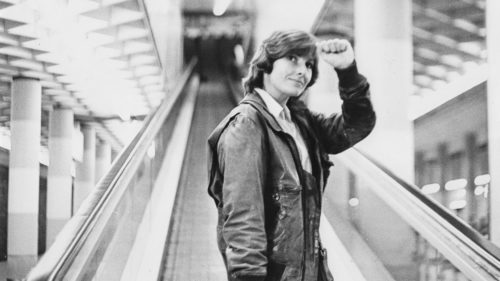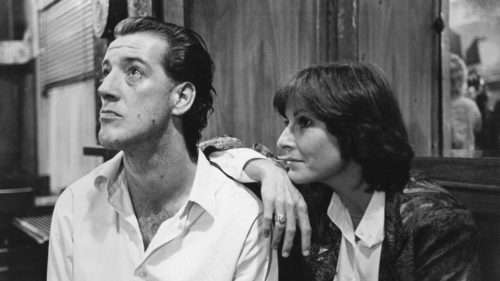THE SILENT PACIFIC
jaar: 1984
duration: 100 min
logline:
A Dutch journalist returns home from South America to attend her father’s funeral. Denying her sorrow and her traumatic experiences she tries to help her mentally retarded brother who lives in an institution. She fails however desperately.
(bron: DS 2018)
synopsis Berlinale:
Marian Winters’ journalistic tour of duty in South America had been tragic and traumatic: the man she loved had been murdered by the military and her reports had hardly affected political action at home. Now back in Holland, secretly married to a mutual friend so that he will be allowed to enter the country, she is again confronted with callousness and bureaucratic narrow-mindedness: the police want to deport her husband/friend and her loving relationship to her retarded brother takes a tragic turn paralleling her South American experience.
(source Filmfest Journal Berlinale)
synopsis:
Marian Winters returns home from South America to attend her father’s funeral. It is the first time in years that she sees her mother, sister, brother and Frits, an old friend of her father’s and editor of the publication she worked on in South America. No one realizes she has come home for good, even though she has no plans for the future. She also keeps from her relatives that she has married to Enrique to help him get a residence permit. As Enrique finds it hard to adapt to the Dutch way of life, he seeks contact but she is very evasive. Simply being married to Marian is not sufficient to entitle him to a permit. She strictly vetoes his request to share a flat with her. Most of her attention is absorbed by her mentally retarded brother who she feels has a right to a life of his own in a normal environment.
(source: Hannelore Goossens)
Years ago Marian Winters left for South America convinced that she had a task of fulfil there as a journalist. Now she has returned to The Netherlands. Her father has died. Though everyone expects her to leave soon after the funeral, it turns out she has come back for good without any clear plans for the future.
During her stay on the other side of the ocean Marian has lost the emotional distance necessary for doing her job well. Together with her friend Miguel she has become involved in increasingly more dangerous situations over the years, to reveal the real facts. One night when Miguel is picked up and violently murdered later on, Marian collapses completely. All at once she loses courage and trust in her work.
And just as she is about to leave South America she receives notice that her father has died. As one final act of solidarity she marries Enrique Enez, a comrade of Miguel’s. She helps him escape the country and provides him with a visa in Holland. They arrive together at Schiphol and then go their separate ways. Marian arrives at her parent’s house which looks out on a river. The house and the adjoining brickfactory seem unchanged in the light of the early morning sun.
She is moved by the peace this image transmits. In the house her mother Emilia, her sister Rita and Fritz Rosmeyer, an old friend of the family and editor-in-chief of the newspaper Marian works for, are all completely occupied with mourning the death of her father and planning the funeral arrangements. They are happy to see her and ask her about her work. They all look for the intimacy of years past but Marian feels an unbridgable gap between them and asks herself what everyone here could possibly understand of her experiences. There is no place in this house for her grief, the grief for Miguel.
The only person she does feel affinity towards is her brother Emil. He normally stays in an institution, because he is men¬tally deficient and cannot cope with daily life. Everyone in the family is reconciled to the fact that this is the best solution for his deficiency. Marian thinks her brother deserves a better life than one in an institution.
Enrique is having problems adjusting to Dutch society. He wants to get in touch with Marian. His marriage to her does not appear to give him grounds for a residence permit as long as they are living apart. He asks Marian to come and live with him, but for Marian this is impossible.
She occupies herself with Emil almost to the point of monomania. Emil who asks nothing yet appears to sense her grief. And he then becomes the only one she trusts with the story of her sorrow.
After an interview that has gone wrong with an editorial team of a news show which Enrique had informed about the murder of her friend Miguel, Marian secretly takes Emil out of the institution late at night. She is in a state of confusion and is no longer able to draw the boundaries between Emil’s interests and her own. She goes with him to her sister Rita’s house who lives in Antwerp. Rita turns out to be not at home and after roaming around they finally end up at Enrique’s house. How¬ever, Emil causes such chaos that Enrique’s landlady threatens to call the police thereby endangering Enrique. They have no choice other than to leave in the dead of the night and go to Emilia’s house.
Next day two policemen come who want to take Enrique in for questioning. It is then that Emilia discovers that her daughter is married, The confrontation with the policemen leads to a fight in which Emil again takes part. Completely shattered he is taken back to the institution.
In a last dutch stand effort to work things out and not able to accept help from anyone whatsoever, Marian retreats to a hotel on the seaside. She tries to follow Fritz Rosmeyer’s advice to attempt to write down her experiences in South America, but everything fails. Confronted with the photographs from that past for the first time she surrenders totally to the grief that she has been suppressing all this time.
When Enrique comes to tell her that he is going to be deported because their marriage is considered invalid, Marian feels completely powerless and pleads with Enrique to leave her alone. She goes to visit Emil again in the institution but he is in such a bad state that contact is virtually impossible.
Upon leaving the institution she finds Emil standing waiting at her car. A sight that leads her to desperation.
(tekst flyer)
with:
Josée Ruiter, Andrea Domburg, Josse de Pauw, Monique Kramer,
Julien Schoenaerts, Rafi Nahual
direction: Digna Sinke
screenplay: Annemarie van de Putte
director of photography: Albert Vanderwildt
sound: Lukas Boeke
editing: Jan Wouter van Reijen
composer: Peter Vermeersch
production manager: Conny Brak
co-producent: Marion Hansel
line producer: Hans Klap
production company: De Eerste Amsterdamse Filmassociatie Van 1980 B.V.
coproducent: Man’s Films S.P.R.L.
wereldpremière: competitie Berlinale 1984
NL première 13 maart 1984
release 15 maart 1984
end titles
cast:
Josée Ruiter (Marian Winters)
Andrea Domburg (Emilia Winters)
Josse de Pauw (Emil Winters)
Monique Kramer (Rita Winters)
Julien Schoenaerts (Frits Rosmeyer)
Rafi Nahual (Enrique)
Luis Granados (Miguel)
Reinout Bussemaker (caregiver institute)
Elsje de Wijn (receptioniste)
Gerrard Verhage (journalist)
Cor Witschge (porter)
Jan Moonen (receptionist hotel)
Johan Leysen (Jan Verstraete)
Pim Lambeau (landlady)
Peter Tuinman, Wick Ederveen (police men)
Andrea Fiege (caregiver)
Arthur Boni (fphoto shop)
Trix Bellens (girl in café)
Jaap van Donseláar, Diane Lensink, Jes Vriens, Homero Rivera (TV-editorial team)
crew:
director of photography: Albert Vanderwildt
camera assistant: Wouter Suyderhoud
gaffer: Hans Burghard, Willie Stoefs
grip: Geert van Blokland
second unit camera crew: Jules van den Steenhoven, Frank van Zutphen
art direction; Hemmo Sportel, Gert Brinkers
assistance art direction: Rob Bos, Ludo Volders
set construction: Jan van de Berg
stills: Max de Winter
catering: Anja Mudde
scriptgirl: Annemarie van de Putte
sound: Lukas Boeke
sound assistant: Paul Gies
costumes/make up: Natasa Hanusova, Paco Baez, Patricia Lim
stuntman: Harry Wiessenhaan Montage: Jan Wouter van Reijen
assistant to the editor: Harmen Dijkstra
production manager: Conny Brak
first assistant: Wilfried Depeweg
location manager: Sjef Verbraaken
production secretary: Marjon van Schaik
best boy: Roel Ypma
produktion-assistants: Elly Klaassen, Jaap Pouwer
production manager Belgium: Michèle Tronçon
first assistant Belgium: Gerda Dieddens
production Spain: Pedro Alfonso Fererez sr.
produktion-assistant Spain: Pedro Alfonso Fererez jr.
camera-assistant Spain: Julio Sanchez Cavaliero
screenplay: Annemarie van de Putte.
comper: Peter Vermeersch
performed by: UNION
laboratory: Cineco
stock: Fuji
co-producer: Marion Hänsel
line producer: Hans Klap
direction: Digna Sinke
thanks to: Pon’s Automobielhandel, Foto Kruyt Noordwijk, Tourist Hotel Antwerpen, Bewoners en begeleiders van ‘De Hartenkamp’, Jeanette Snik, Bram van der Vlugt, Hilde van Mieghem, ‘Ibn Meeuwis ‘s Hertogenbosch, Thomas Deelen, Fam. Donker, Fam. Overeen, Ge¬meente Rossum, De Volkskrant, Wietze Vos, Juan José Ofia, Colombine Instant White



